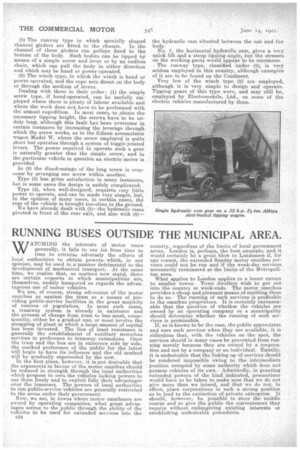RUNNING BUSES OUTSIDE THE MUNICIPAL AREA.
Page 24

If you've noticed an error in this article please click here to report it so we can fix it.
WATCHING the interests of motor users generally, it falls to our lot from time to time to criticise adversely the efforts of local authorities to obtain powers, which, in our opinion, may be used in a manner detrimental to the development of mechanical transport. At the same time, we realize that, as matters now stand, there are certain respects in which municipalities are themselves, unduly hampered as regards the advan tageous use of motor vehicles. . We are, of course, strong advocates of the motor omnibus as against the tram as a means of providing public-service facilities in the great majority of centres of population. In most such cases, -a tramway system is already in existence and the process of change from tram to bus, must, consequently, either be a gradual one, or must involve the scrapping of plant in which a large amount of capital has been invested. The line of least resistance is generally the establishment of auxiliary motorbus servioes in preference to tramway extensions. Once the tram and the bus are in existence side by side, the marked preference of the public for the latter will begin to have its influence and the old method will be gradually superseded by the new. In the first place, however, it is.not desirable that the arguments in favour of the motor omnibus should be reduced in strength through the local authorities which propose to own. the vehicles lacking powers to use them freely and to exploit fully their advantages over the tramcars. The powers of local authorities to run public-service vehicles are generally restricted to the areas under their government. Now, we see, in towns where motor omnibuses are owned by operating companies, what great advantages accrue to the public through the ability of the vehicles to be used for extended services into the c24 country, regardless of the limits of local government areas. London is, perhaps, the best example, and it would certainly be a great blow to Londoners if, for any reason, the extended Sunday motor omnibus services could not be run and if the week-day services necessarily terminated at the limits of the Metropolitan area. What applies to London applies to a lesser extent to smaller towns. Town dwellers wish to get out into the country at week-ends. The motor omnibus provides a cheap and pleasant means of enabling them to do so. The running of such services is profitable to the omnibus proprietors. it is certainly unreasonable that the question of whether the vehicles are owned by an operating company or a municipality should determine whether the running of such services is permissible. If, as is known to be the case, the public appreciates and uses such services when they are available, it is ridiculous that, with the vehicles on the spot, the services should in many cases be prevented from running merely because -they are owned by a corporation and not by a company or an individual. Equally, it is undesirable that the linking up of services should be rendered impossible owing to the intermediate position occupied by some authority which does not possess vehicles of its own. Admittedly, in granting extended powers of the kind indicated, precautions would have to be taken to make sure that we do not give more than we intend, and that we do not, in effect, place corporations in such a strong position as to lead to the extinction of private enterprise. It should, however, he possible to steer the middle course and to give the public the conveniences they require without endangering existing interests 'or establishing undesirable precedents.






































